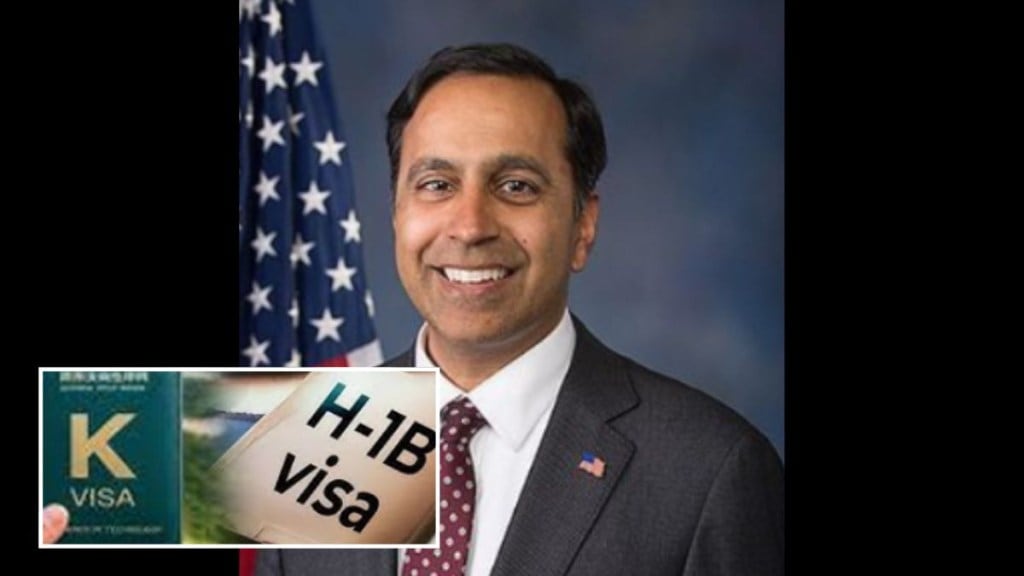Indian-American Congressman Krishnamoorthi, Ranking Member of the House Select Committee on the Strategic Competition Between the United States and the Chinese Communist Party (CCP) has issued a stark warning that China’s revamped visa move involving the newly-introduced K visas will be direct hit to the US economy. He further emphasised that the K visa program launched earlier this month was likely to emerge as a massive threat seeking to weaken US economic competitiveness.
With the US already making monumental moves to crack down the ‘specialty occupations’ H-1B visas that seek to bring in highly skilled and talented foreign workers to the country, the K visa could indeed shape up to be a game-changer for those aspiring for international professional opportunities. US President Donald Trump’s ramped-up $100,000 H-1B visa fee for new applications won’t help the case either.
Indian-American Congressman warns Trump admin of H-1B visa crackdown amid China’s K visa
The top Democrat on the House China committee suggested that the revamped Chinese visa program will act as an additional hindrance driving exceptional talent, including those from the tech world, away from the US. Already anticipating a mass exodus of tech talent from the country, Krishnamoorthi penned a letter to Labor Secretary Lori Chavez-DeRemer, Homeland Security Secretary Kristi Noem, and State Secretary Marco Rubio on Tuesday (US time).
As detailed in a press release by the Democrat committee website, Krishnamoorthi wrote in his letter, “the Trump Administration’s changes to the H-1B, F and J visa process will affect our competition with the People’s Republic of China. These changes include President Trump’s proclamation instituting a $100,000 fee for all new H-1B applicants and the Department of Homeland Security’s rule to establish a four-year time limit on F and J visas for students and exchange visitors.”
Crucial members of the Trump administration and other members of the ‘Make America Great Again’ (MAGA) camp have endlessly taken an issue with the H-1B visa. Having labelled the nonimmigrant visa program a “scam,” they believe it brings in cheap foreign labour as a replacement for American workers. However, Krishnamoorthi offered a different insight in his writing, as he cited a “2024 study.”
Calling immigrant talent “a key pillar of America’s economic engine,” he said the study found “every additional H-1B worker hired increases total firm employment by 0.83 additional employees.” And so, he foregrounded that limiting such incoming talent would ultimately “jeopardise one of America’s greatest strengths–its startup culture.”
As opposed to the US situation, Krishnamoorthi underlined that Beijing was now “throwing its doors wide open” with the K visa, which was “designed to lure young STEM graduates.” Weighing out the repercussions of the US potentially losing out on future founders, doctors, scientists and researchers to China, the Congressman said, “By undervaluing immigrants, we risk handing General Secretary Xi Jinping a strategic coup. The K visa does not simply welcome talent—it diverts the wealth, patents, and job creation that once sustained America’s economic leadership straight into the PRC’s economy.”
Chinese official refutes accusations
While Krishnamoorthi called the visa policy change a “likely deliberate” decision on the part of the Asian nation, Chinese embassy spokesperson Liu Pengyu briefly dismissed the accusations as “groundless.” Without going into much detail, Chinese embassy spokesperson Liu Pengyu said China’s visa program is “not aimed at any specific country.”
What is China’s K visa program?
Launched on October 1, the K visa has already caught foreign national’s attention but locals are not too happy about it. Some Indians are already referred to it as “China’s H-1B.”
Meanwhile, users on Chinese social media are voicing their distaste of the development. “We have so many bachelor’s degree holders, not to mention even more with master’s and doctoral degrees. We already have a surplus of domestic talent – and now you’re bringing in foreign college graduates?” read a comment on social media, as per the BBC.
As far as preliminary details are concerned, the K visa applies to people in STEM (science, technology, engineering and mathematics) fields. The visa is meant for “exchanges related to education, science and technology, culture, as well as entrepreneurship and business activities,” as per the authorities.
According to a government media release in August, the applicants for the K visa must be “who have graduated from well-known universities or research institutions in China or abroad with a bachelor’s or higher degree in a STEM field, or who teach or conduct research work at those institutions.”
Contrary to the US’ H-1B requiring sponsors/employers to back applicants, the K visa will not need any such support from an employer for visa issuance.
Edward Hu, immigration director at consultancy Newland Chase in Shanghai, recently told Al Jazeera that the visa has already generated significant interest among those in India, Southeast Asia, Europe and the US. “The K visa fills a gap in China’s talent system by lowering entry barriers for younger STEM talents – complementing the existing R visa, which targets top-tier experts,” he said.

